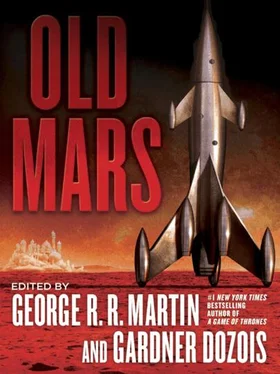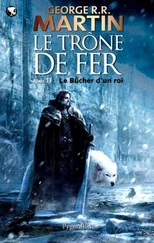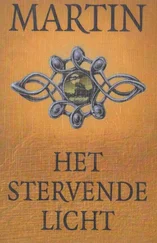His father’s place, close to the north end of town, was both office and home, with a sign above the door that announced, in faded lettering, “Ben Miller and Sons, Tourism. See the Ancient Ruins.” His father had been optimistic while his mother was alive, but there had never been more than one son; and the son-in-law who might have worked with him but worked for the regional utility instead was unimpressed by the grants his father-in-law had gotten from Syrtis University and the remains of the six ancient villages he had discovered over the last thirty years; archaeology on Mars, Bev’s husband said, wasn’t worth much beyond entertaining a few tourists.
Dave closed the scooter into the side shed and tried the office door. It wasn’t locked. Nothing in Charlestown was ever locked, although a key hung from the handle in case anyone wanted to use it. Inside, he found the tiny front room that served as an office dark, its windows too grimy to admit more than a hint of morning sunlight, and the light switch dead under his hand. He left the door open, and the splash of light showed undisturbed dust everywhere. He flicked on the battery-powered flash every Marsman carried and went to the door separating the business from the living quarters. In his father’s bedroom, the bed was rumpled, but the bureau drawers were closed, the clothing in them neatly folded, and the jacket he always wore in the field was missing from its hook. Farther on, Dave’s own bedroom was just as he had left it, with a couple of school trophies on the bureau and a pair of old shoes under the bed.
“You don’t have to come back,” his father had said. But Dave had always known he would. Ben Miller and Sons. Home.
The first few months away had been hard. There had been homesickness, of course, but he had pushed that aside with exercise, first on the ship and even more on Earth itself, until the feeling of wearing a backpack that weighed twice as much as he did eased. By then, graduate school and all the sights and experiences of the exotic mother planet had absorbed him, and thinking about home no longer bothered him. Except perhaps when he woke up on a clear morning and saw that piercingly bright sunlight—the light that was never so strong on Mars—between the curtains.
He dropped the duffel on the bed and opened his own bureau drawers one by one, trying to remember what else he had left behind. Not much. There were a couple of T-shirts in the bottom drawer. And underneath them was a small notebook.
He’d always carried a notebook when he went out exploring, but his had gone with him to Earth and were in his duffel now. This was one of his father’s. Only the first page had anything written on it. There was a date at the top, nearly five Martian months ago, and below that were a few lines in his father’s familiar hand, about likely ruins where the Alcronius canal emerged from the northern ice cap. It was a good lead, his father’s notes said, because it came from the oldest Martian he had ever met, who had once helped him by translating some barely legible inscriptions. A good lead, but a long trip, and he was sure he and Rekari would be gone for quite a while, checking it out. At the bottom were the coordinates of the place.
As of the date of the entry, the northern ice cap had been as melted as it ever would be, and the canal current had ebbed. You could easily take a boat north then. Rekari had a boat. Dave had seen it at the dock.
He was tired after the long ride, but he was even more hungry. The cabinets in the tiny kitchen were empty; his father had probably taken their contents on the trip north. So Dave went out to see if one of the local restaurants had anything interesting, which on Mars meant anything at all. Jacky’s, just down the street, had peanut butter and flatbread for breakfast, and Dave was glad enough for that. As a student on Earth, he hadn’t eaten much better.
“I don’t know that your dad thought you’d come back,” said Jacky. She was tall and thin, with cheeks weathered by the Martian winds, but she had a smile for him, and a treat of homemade blackberry jam. Jacky had always been a better big sister than Bev, and Dave had often wondered why his father hadn’t married her and made her a real part of the family.
“He’s been gone quite a while, hasn’t he? My sister said months.”
Jacky looked at her watch. “One hundred and thirty-three days.”
Dave leaned an elbow on the table, gathered up a few crumbs of the flatbread, and tossed them into his mouth. “I saw Rekari’s boat at the dock. Did he go along?”
Jacky nodded. “But he came back, a month or so ago. He said somebody had to look after the business. Not that there’s been any lately. I haven’t seen a tourist since last year.”
Dave paid the check in Earth creds, and Jacky tucked them into her shirt. “It’s good to see you back, kid. Maybe there’ll be something better for dinner. I hear the Warners have an extra chicken. I might be able to talk them out of it.”
“I’d like that,” said Dave.
“Check back at five.”
He went outside and headed for the Martian quarter.
The main street was busier now, with people doing their morning shopping before heading out to the scrubby fields of genetically modified peanuts, potatoes, and barley that stretched eastward from Hiddekel. On the west side of the canal, someone seemed to be trying to raise wheat again—that happened every decade or so, according to his father, when new settlers arrived from Earth. It never worked very well, but it usually produced enough spindly stalks to feed a few goats. Dave had eaten plenty of wheat bread on Earth, and he didn’t think it was anything special. Chicken, though, was something else.
Several people stopped to say hello to him, to ask about his experience on Earth, to tell him how good he looked, and it was much more than a ten-minute walk before he finally reached Rekari’s compound. The arc of cottages there, with its open side to Hiddekel, which the Martians called Moreyah, had stood, Rekari once said, for a thousand years, which wasn’t all that long by Martian standards. The cottages themselves were made of a local soft red stone, with roofs of woven plant fiber coated with hardened clay. The Martians grew the plants for their seeds, which humans considered inedible, and fed the seeds not just to themselves but to small lizards living in burrows in the canal walls. The lizards were their primary source of protein, and humans also considered them inedible. Dave had tried lizard stew once, and only courtesy kept him from spitting out his first and only mouthful. He had always thought it was a good thing that Rekari’s people felt much the same about human food—that meant there was little competition for those kinds of resources between Martians and Marsmen. Although his father had insisted that in an emergency, Martian food would not kill him. Fortunately, Dave had never needed to test that claim.
Rekari’s son Burmari was in the center of the arc, working on a boat that was obviously new and nearly finished, only the mast and sail missing. When he saw Dave, he made the Martian sign for welcome, then walked over to clap him on the shoulder in a human greeting. Like all Martians, Burmari was thin and wiry, with ruddy skin and large, pale eyes, and he was more than a head taller than any Marsman. Dave smiled and reached up to return his greeting. They had known each other all of Dave’s life.
“School treated you well,” said Burmari. “You look healthy and strong.”
He spoke in the local Martian language, but Dave had no trouble understanding him; since childhood, he had been as fluent in it as in English.
“Extra gravity will do that,” said Dave. “But I’m happy to be back where there is less of it. Where is your father?”
Читать дальше












